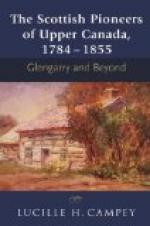[Footnote 1: See Sir Alexander Mackenzie’s Travels, p. 5.]
Amongst the pioneers in this new development of the fur trade, who became also the great explorers of northernmost America, was Alexander Henry (already described), THOMAS CURRIE, JAMES FINLAY, PETER POND,[2] JOSEPH and BENJAMIN FROBISHER, and SIMON M’TAVISH. These and some of their supporting merchants in Montreal resolved to form a great fur-trading association, the celebrated North-west Trading Company, and did so in 1784.
[Footnote 2: Peter Pond was a native of Connecticut, and in the opinion of his trading associates rather a ruffian. He was strongly suspected of having murdered an amiable Swiss fur trader named Wadin, and at a later date he actually did kill his trading partner, Ross.]
Two of the Montreal merchant firms participating in this confederation (Gregory and M’Leod) were inclined to play a somewhat independent part, and called themselves the New North-west Trading Company. They had the foresight to engage as their principal agents in the north-west (Sir) ALEXANDER MACKENZIE and his cousin RODERICK MACKENZIE. Both these young men were Highlanders, probably of Norse origin. Alexander Mackenzie was born at Stornoway, in the Island of Lewis (Hebrides), in 1763. He was only sixteen when he started for Canada to take up a position as clerk in the partnership concern of Gregory & M’Leod at Montreal.
It may be said here briefly that this “New North-west Company” went at first by the nickname of “The Little Company” or “The Potties”, this last being an Amerindian corruption of the French Les Petits. Later it developed into the “X.Y. Company”, or “Sir Alexander Mackenzie & Co.”. Although much in rivalry with the original “Nor’-westers”, the rivalry never degenerated into the actual warfare,




